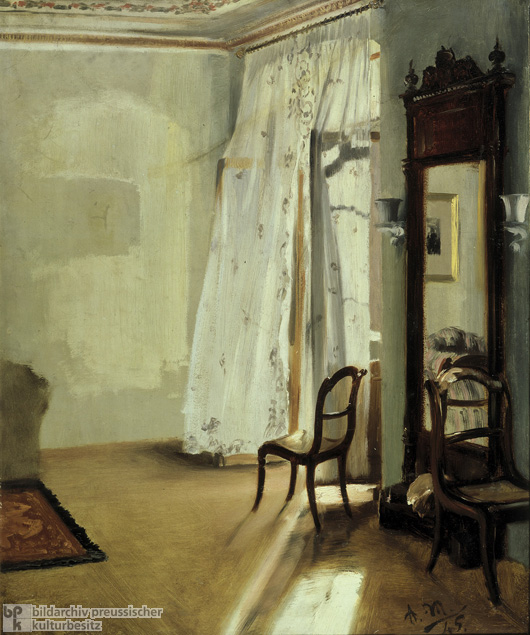 |
| Adolph Menzel The Balcony Room, oil, 1845 |
 |
| Adolph Menzel, The Studio Wall |
"He compared glazing or similar transitions with transparent colors to the use of the pedal on the piano, stating that a good pianist can play everything as if he was using the pedal. Yet as a matter of fact everything has to be played on the keys themselves without the tones getting blurred.”
-----
Thanks to Christian Schlierkamp and Christoph Heuer for help with the translation.
From Paul Meyerheim







8 comments:
I wonder if his move in this direction was prompted by his frequent use of gouache, a medium that in general does not encourage glazing.
What Charley says sure rings a bell with me. I was totally entranced by gouache over the summer, and it seems to've helped me get a lot less fussy with oils. And oils have pushed me toward increasingly subtle handling with gouache. Around and around--Yin and Yang--works for me!
And Charley, I'm a big fan of Lines and colors!
...reminded me of Wilhelm Leibl: The story goes that, looking at a painting from a "competitor", he exclaimed:
"This pig is glazing away, methinks!"
Very interesting. That implies that the majority of the artists of his time typically *did* paint with a lot of glazes.
Boy "The Studio Wall" is a gorgeous painting!
That being said, there are too many amazing paintings that do employ glazing for me to be on board with a wholesale criticism of that technique. But maybe that's not what Menzel was saying so much as to extol the value of learning to paint directly with the right value. I personally feel that I need to understand as much about as many techniques as possible. The more tools in my belt the better.
...I do concur.
One of the most amazing glazers, for me, with all his magic tissues and effects,
is Eugene Delacroix.
Leibl probably was less open- but pretty partisan-minded;-)
All of you guys have great comments! I agree with them all.
Charley and Jeff, I was thinking the same thing. Gouache doesn't like glazing! If you use it opaquely it forces us to hit the right value and color right the first time (plus deal with the value shift).
And Tom and Rich, glazing techniques, particularly glazing over "dead" or grisaille underpaintings has yielded some of art's masterpieces: Titian, Velazquez, Rembrandt, all used glazing—as you had suggested, Keith.
In the hands of someone like Maxfield Parrish or many of the PreRaphaelites, glazing can yield tremendous richness and depth of color. Glazing in oil, however, is less ideal for outdoor painting under trying conditions. And it can lead to deadness in the shadows. The pros and cons of "direct" and "indirect" methods were a huge topic of discussion in Menzel's day and after. Solomon Solomon's book spends a great deal of time discussing the merits of each method.
I assume that the disdain towards glazing was in its use as a corrective method for tones or colors laid down imprecisely. But the way it was used by the old masters, glazes were laid over an already fully or near-fully worked out value scheme. I personally think transparent oil paint is orders of magnitude more visually pleasing than opaque. The gem-like surfaces of a Van Eyck have not been beaten in 500 years, and little equalled. If the abstract expressionists had used transparent oil paint, I might have actually liked some of their work. A pasty, chalky canvas is an eyesore.
Post a Comment